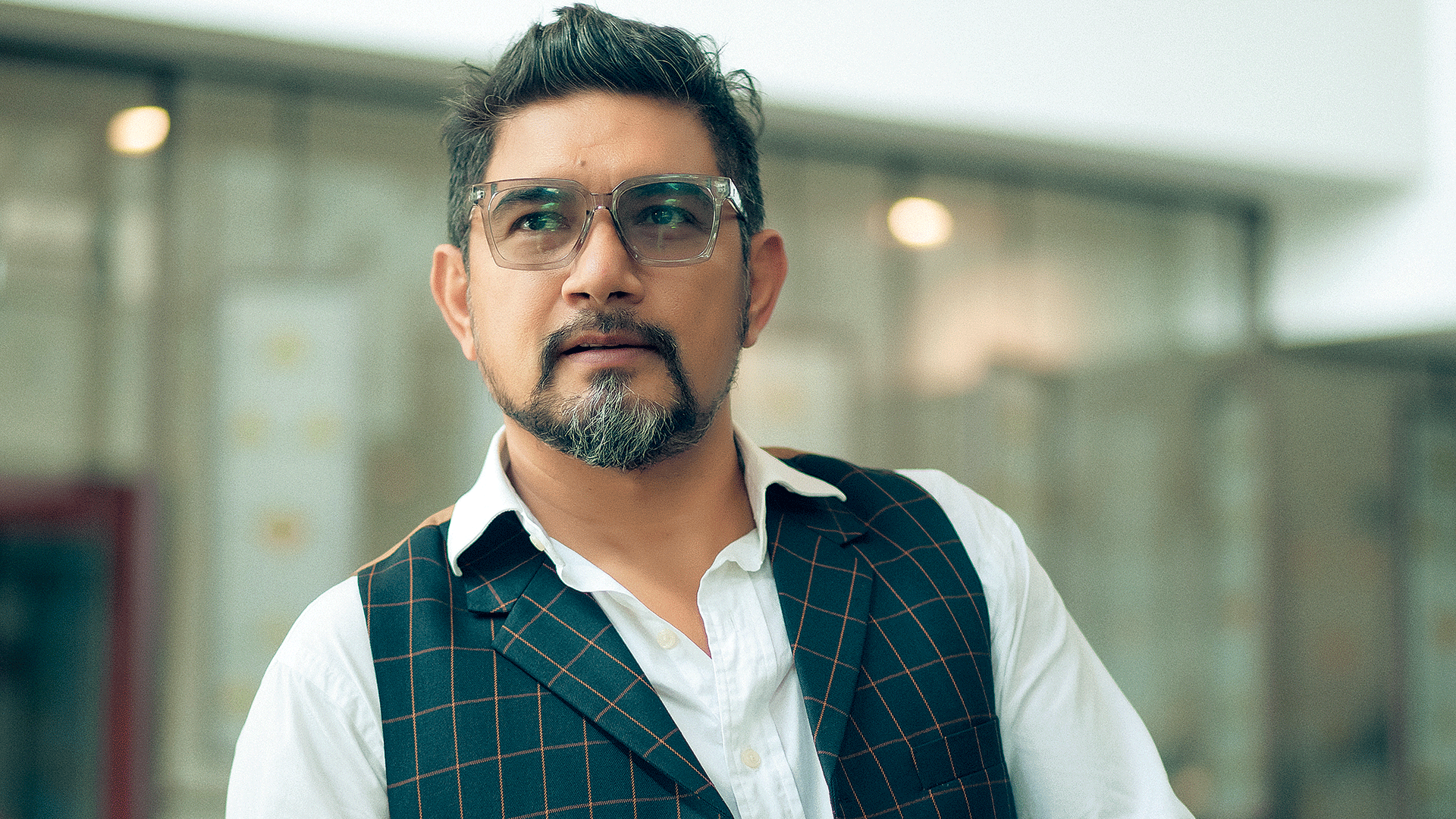Born in Kalaiya Bara District and raised in different small towns of Nepal, Subarna Thapa is a renowned film director. His career started as an actor in a French play and later he wrote his first short film Malami which was funded by the French government. The 20-minute-long black and white movie is based on a play by Saru Bhakta Shrestha and is directed by Subarna Thapa. Though his acting career started in Nepal, his career was shaped in Europe.
Over the years, he has directed films like ‘Soongava’, ‘Fanko’ and ‘Bato Muni ko Phool 2’ among many other short films. He graduated from the Cours Florent, Paris in Dramatic Arts. He has played many roles in both France and Nepal, honing his craft at the Comédie Française, Paris, and also with the Japan Foundation in Tokyo and the Asia Society in New York. His first short film, Malami – 2008 was screened at different international short film festivals, and earned several awards and was also broadcast on French National TV.
In a candid conversation with WOW, Subarna Thapa recalls his initial days of his journey in the reel world, his love for art films, and how sound plays an important role in his films. Excerpts from the interview:
How did you get into filmmaking? Do you have a formal education in it?
Talking about my childhood, I was born and raised in a simple family. My childhood revolved around home mostly, with school and friends being a part of it. Although I was born in Bara, I grew up in different small towns of Nepal. Studying in Hetauda, Kathmandu and France, I have seen life from different lens. In Kathmandu, I started studying management while I was also working in a travel and trading company. An application was opened in France Culture Center for actors. I filled that application though I was not totally into films at that time; I wanted a taste of what the field offered, inspired by my elder brother who was friends with some actors and directors. In between, I trained under dance director Basanta Shrestha. I was into dance, poetry and Hindi movies, all of which influenced me to get into acting. Coming back to the application, I got selected in the audition round which was orientated to workshops for a French play and also got a good part. This was my baby steps to a career in theater, not as a director but as an actor. And then, I got the chance to interact with more actors and directors.
In 1995, three of my friends and I got a scholarship to study the French language. After that, the group of four made a small formation and started to perform. In 1997, our group was sent for educational and cultural workshop. My French was getting better. As my studies was about to complete, I was confused about whether to choose to go to Delhi National School of Drama or stay back in France. I chose to stay in France to complete my studies in theater school. I had already begun my career in France and there was no looking back. I started my career as an actor with Peter Brook’s daughter Irina Brook, Arianne Mnouchkine based on a workshop. I also worked in international projects like Japan Foundation. I was working like this from 2004 to 2006. My dad passed away in Nepal for which I was unable to return and in the same year I wrote my first short film ‘Malami’ funded by the French government known as CNC and from that point onwards, my career evolved as a writer and director.
Who do you look up to as a filmmaker?
If it was meant to be 20-25 years ago when there was no international exposure, we would be inspired by our mother, father, friends or teacher. But nowadays we have open access to so many things… documentaries, movies, books. While making Malami I was really inspired by Andrei Tarkovsky, the way he maintained his relationship with his father, watching him I wished he were my brother.
There are many filmmakers of whom I am jealous and also inspired by. I cannot choose one of them. I like filmmakers who try to show the reality of human life and relationships.

Your films that are closest to your heart?
I like all my films as I make them with joy. I make my films investing all my time, hardship, happiness and money. But I love those movies of mine which didn’t make commercial success. Those movies are like a handicapped child for me, I was unable to put more love and care into those movies, but they allow me to grow as a filmmaker.
From Sungava: The Dance of the Orchids, Chora, Fanko, Bato Muniko Phool 2 and Radha, I see the growth within me. All movies have played a vital role in my life.
How difficult is it to make films in Nepal?
Film making is difficult because everyone has their own way of thinking and perspective. It is difficult to find a producer who believes in your story. Nowadays, filmmaking has become easier than earlier economically. We can get all the tools we want, a small team is enough, and outdoor shoots are easier than on sets. It is now easy to make your first movie. The second movie is a bit difficult because people would expect it to be more exciting and better than your first. By the third movie, the filmmaker must aim to be established and recognised.
People have their own interest of why they work in this field, and one can also learn what one is really good at. I wanted to make this my profession because I wanted the taste of box office success. I have done five films commercially but I still have to work better to gain the success I desire.
What are some of your biggest challenges while making films?
It was challenging while making Sungava as people already knew that it is an excellent story before the movie was released. But no one was ready to produce it due to which I had to fund it myself. I used the money I kept for my further studies. When you try to do something new, there are several obstacles. If I had made movies which include songs and fights, many producers would have offered to produce it, but I chose to create an impact in the film world.
Your films are praised for their sound design. Why do Nepali movies struggle to create compelling soundscapes?
In the movie Malami all the sound editing was done in France. All the devices and even the soundman was brought from France. In films, we don’t need music if the quality of dialogue and sound are good.
I used sink sound in both Malami and Radha. Apart from this, we re-recorded every sound which were over voice and off voice. A type of clarity and dimension appears in the sound design and makes it more natural.
The exciting thing about Sungava is that I didn’t use sink sound in that movie. All the production of the movie was done in France though I did all the dubbing from here for the ease of the editor. After the sound editing, we brought sound engineers then redubbed the sound in a silent hall with the actors including all the moments created in the movie. I made the soundman follow all the due processes. Till date people are unable to determine whether it is dubbed or not. Talking about Radha, we did it in Barcelona at a very low price but good sound design. This way, my movie sounds are better.
Hospitality partner: The Ministry at Hotel Ambassador
The Ministry at Hotel Ambassador by ACE Hotels is a venue to know. It is a ground-floor chic coffee shop and bar adjoining the lobby. It is ideal for a post-work drink with its special Follador Prosecco cocktails, and is probably the only venue in Kathmandu offering cold-pressed Fuji apple juice, and of course there’s Segafreddo coffee for caffeine lovers. And if you want to take a special someone for a date, treat them to Kathmandu’s only Bridgerton-esque La Mari hi-tea set. The Ministry also serves a highly curated menu of gourmet sandwiches and salads for light lunch or as a mid day meal, so there’s something special just about for everyone.
ambassadornepal
hotelambassadorbyace

